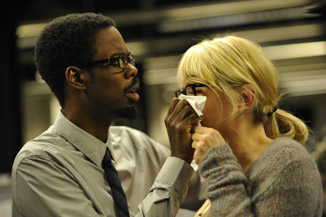|
|
BOP Interview: Julie DelpyBy Ryan MazieJuly 11, 2012
On why she shoots in a French New Wave Style with plenty of jump cuts: JD: “I love jump cuts and I love the energy of camera movements that give it a feel like you aren’t watching a movie, but are just in it. What [Jean-Luc Godard] did with the jump cuts, which is like a transcending narrative, gives you a sense of time that flows differently and I’ve always liked that. It also gives it rhythm. If it weren’t for the editing in this film, it would be kind of dragging. It has a lot of energy, because the editing is very boom-boom-boom-boom-boom which gives it a sense of chaos. But that is really created in the editing room and mixing room, because people talking on top of each other doesn’t happen on set or otherwise you couldn’t edit a film. “I put the sister fighting on one side of the room and then the dad on another side and you jump cut back and forth – it’s a lot in post-production that creates the chaos I want.” On writing the film after her mother’s death: JD: "When I started writing the sequel she was alive. Then she passed away after I had a baby, so I put the film on hold. 'Forget it, I’m not writing it.' But then there is this side of me that said she always wanted me to write movies and so I decided to write the film with her in mind and very subtle with her death as a little line in the film. But the film is very much about the loss, even with the comedy; I didn’t want to make it all doom and gloom, because my mother was a very happy person with a great sense of humor until the very, very end. She would even joke about the terrible state she was in until there was no joking for anybody anymore. It’s always better when you think of a happy thing, even when people are gone."
|

|
|
|

|
Saturday, May 4, 2024
© 2024 Box Office Prophets, a division of One Of Us, Inc.


